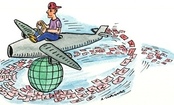Areas of Research: |
|
|
Education, Neoliberal Culture, and the Brain
By Gary Olson / July 6th, 2013 Dissident Voice Whereas the evolutionary process has given rise to a hard-wired neural system that equips us to connect with one another, many experts believe that our empathically-impaired society needs nothing less than an “empathy epidemic.” Among the factors frequently cited as interfering with constructing an empathic culture we find everything from parenting, education, and economic inequality to early childhood programs, meaningful social connections, and misplaced emphasis on achieving social status. Gary Olson is professor and chair of the political science department at Moravian College in Bethlehem, PA. He is the author of Empathy Imperiled: Capitalism, Culture, and the Brain (New York: Springer-Verlag, 2013). Why Do The Mega Rich Continue To Work? - Forbes
January 29, 2013 Depending on the day, my number varies between $1 million and $50 million. My friend says she can be happy with $100,000. Another sets her limit at $10 million. The 1% Are the Very Best Destroyers of Wealth the World Has Ever Seen
by George Monbiot/The Guardian/UK November 8, 2011 Our common treasury in the last 30 years has been captured by industrial psychopaths. That's why we're nearly bankrupt. Is The Market Rational? No, say the experts. But neither are you--so don't go thinking you can outsmart it.
(FORTUNE Magazine). By Justin Fox. December 9, 2002 Tax Cuts For The Rich Linked To Income Inequality, Not Economic Growth, Study Finds
The Huffington Post Bonnie Kavoussi 09/17/2012 A new study by the nonpartisan Congressional Research Service has found that over the past 65 years, tax cuts for the rich have not led to economic growth and instead are linked to greater income inequality in the United States. Why Inequality Is Bad for the One Percent
The Greater Good By Jason Marsh | September 25, 2012 What Mitt Romney’s “47 percent” video reveals about the links between inequality, compassion, and happiness. Related Articles from the Greater Good
Dismantling the Dix Legacy The End of Compassion
by Tom Campbell October 29, 2012 Richmond County Daily Journal - My Spin The physical abandonment of the Dorothea Dix campus in Raleigh is a final exclamation point on the state’s moral abandonment of the mentally ill, essentially returning us to mid-19th century conditions when the mentally ill were confined to jails, locked in attics or hidden from sight in poorhouses. Johnson Cornell University
Bob Frank's research on the perils of income inequality lauded in NYT OpEd November 9, 2010 Concurring with Frank et al., opinion piece discusses the by-product 'keeping up with the Joneses' effect of income inequality In "Our banana republic," (New York Times, Nov. 6, 2010), Nicholas Kristof states: "Inequality isn’t just an economic issue but also a question of human dignity and happiness. Mounting evidence suggests that losing a job or a home can rock our identity and savage our self-esteem. Forced moves wrench families from their schools and support networks. In short, inequality leaves people on the lower rungs feeling like hamsters on a wheel spinning ever faster, without hope or escape." Krugman and Stiglitz: Crazy Austerity Policies Inflict Untold Damage on Economy
AlterNet / By Lynn Stuart Parramore October 24, 2012 Two Nobel laureates, an election, and a shaky economy. The message? We can do a whole lot better. The United States of Inequality
By Timothy Noah SLATE Sept. 3, 2010 Timothy Noah kicked off this series by looking at whether race, gender, or the breakdown of the nuclear family affected income inequality, and then he examined immigration, thetechnology boom, federal government policy, the decline of labor unions, international trade, whether the ultra wealthy are to blame, and what role the decline of K-12 educationhas played. In conclusion, Noah explained why we can't ignore income inequality. PDF below:
Wealth, Income, and Power
by Prof. G. William Domhoff, Sociology Dept. UC Santa Cruz First posted September 2005; most recently updated October 2012 This document presents details on the wealth and income distributions in the United States, and explains how we use these two distributions as power indicators. The Brutal Truth About How Childhood Determines Your Economic Destiny
Lynn Stuart Parramore, AlterNet January 10, 2013 The British class system looks frighteningly rigid in "56 Up." But is America any better? Kenny, C., Lincoln, T., Collins, C., & Farris, L. (2006). Spending Millions to Save Billions: The Campaign of the Super Wealthy to Kill the Estate Tax. Washington, DC: Public Citizen / United for a Fair Economy.
AlterNet / By Lynn Stuart Parramore
The Obscenely Rich Men Bent on Shredding the Safety Net CEOs talk about shared sacrifice, but the only thing they want to share is your retirement money with their wealthy friends. December 3, 2012The Campaign to Fix the Debt is a huge, and growing, coalition of powerful CEOs, politicians and policy makers on a mission to lower taxes for the rich and to cut Social Security, Medicare and Medicaid under the cover of concern about the national debt. Global Peace Index
The Great Divide: Global income inequality and its cost Income inequality is surging, and there are few countries where it is rising faster than the United States. The distance between rich and poor is greater in America than nearly all other developed countries, making the US a leader in a trend that economists warn has dire consequences. GlobalPost sets out on a reporting journey to get at the ‘ground truth’ of inequality through the lenses of education, race, immigration, health care, government, labor and natural resources. The hope is to hold a mirror up to the US to see how it compares to countries around the world. High Deprivation, Population Density And Inequality Found To Increase Rates Of Schizophrenia
Medical News Today 20 Dec 2012 Higher rates of schizophrenia in urban areas can be attributed to increased deprivation, increased population density and an increase in inequality within a neighbourhood, new research reveals. The research, led by the University of Cambridge in collaboration with Queen Mary University of London, was published in the journal Schizophrenia Bulletin. Inequality Is Holding Back The Recovery
Joseph Stiglitz From opinionator.blogs.nytimes.com -January 19, 2013 Our economy won't come back strong unless it also becomes more fair. America Faces Catastrophic Levels Of Inequality - Business Insider
January 29, 2013 Robert Reich is one of the nation's leading experts on work and the economy, is Chancellor's Professor of Public Policy at the Goldman School of Public Policy at the... Inequality for All: Sundance Review
From www.hollywoodreporter.com– January 19, 2013 Policy wonk Robert Reich cuts through fiscal-cliff jargon to explain the true economic crisis facing the U.S. in this illustrated lecture. A Comment on What’s Causing the Rise in Inequality
From econospeak.blogspot.fr - January 18, 2013 RT @LiberalAgonist: Some fresh thinking from Peter Dorman on the causes of income inequality: http://t.co/1SyWjKZu The Cost of Inequality: How wealth and income extremes hurt us all | Oxfam GB | Policy & Practice
From policy-practice.oxfam.org.uk - January 18, 2013 Oxfam GB is a leading aid and development charity with a worldwide reputation for excellence and over 60 years of experience, working with partners in more than 70 countries. Ill Fares The Land: poverty, inequality and the crisis of capitalism
Fromwww.internationalfuturesforum.com -January 25, 2013 RT @graham_iff: 'Ill fares the land: poverty, inequality and the crisis of capitalism' (with a Scottish post-Davos twist) http://t.co/wAJoWFhD Feeling powerless increases the weight of the world... literally
From medicalxpress.com Scientists have found that people who feel powerless actually see the world differently, and find a task to be more physically challenging than those with a greater sense of personal and social power. For the Love of Money
From www.nytimes.com We are letting money addiction drive too much of our society. When charitable acts are perceived as 'tainted' by personal gain
From medicalxpress.com We tend to perceive a person's charitable efforts as less moral if the do-gooder reaps a reward from the effort, according to new research. The Luxury of Invisible Privilege
From goodmenproject.com Jackie Summers examines the way racism reproduces - and how well-meaning people feed the disease by denying their privilege. Trader Psychology: Why the Stock Market is Always Right
From www.pretzelcharts.com The need to be right, at least on occasion, is important to an individual's self-esteem. Most of us don't feel as good about ourselves when we're wrong, so some of us ... Why We're So Materialistic, Even Though It Doesn't Make Us Happy
From lifehacker.com No matter who you are, it's easy to get a little caught up in the idea of getting new stuff. Here's a look at why your brain is so materialistic and what you can do to keep it from overwhelming you. Why Materialistic People Are Less Happy in Marriage | TIME.com
Hot on the heels of a study suggesting that people who have a car, investments or other personal wealth are more likely to marry drops the other shoe: a study that suggests that people who prioritize money are less likely to be satisfied The Psychological Need the Wealthy Can't Fulfill - Pacific Standard
From www.psmag.com - March 1, 2014 Attempts to explain their zealous defenses of the one-percent generally involve phrases like “limited view of reality” or “social bubble,” but perhaps the most interesting... Rosmann: Happiness tied to usefulness, altruism | INFORUM |
From www.inforum.com - March 8, 2014 Many of us wonder, “Would I be happier if I won the lottery or were rich?” Others ask, “Do wealthy people live longer?” The questions are straight-forward, but the answers are complex. Can Money Buy Happiness? The Science of Materialism, Animated
From www.brainpickings.org Experiences vs. things, or why the emotional rewards of pro-social spending outshine those of self-interest. Bargain for billionaires: Why philanthropy is more about P.R. than progress
From www.salon.com - Feb 10, 2014 Charity is great, but it won't bring real change — and worse, it perpetuates the myth that we need the ultra-rich |
| ||||||||
Psychological Effects of Power, Wealth, and Privilege

Why so many rich Americans think they’re middle class
From www.salon.com - December 21, 2014 Recent remarks from Treasury Secretary Jack Lew help shed light on a troubling phenomenon This is your brain on money: Why America’s rich think differently than the rest of us
www.salon.com - SEAN MCELWEE OCT 11, 2014 Nobody's perfect. But only the rich get away with thinking that their luck and their flaws are actually strengths Life Among the Plutocrats -- What Unimaginable Wealth Does to a Person
They control our politics, shape our societies, outsource our jobs. January 4, 2013 |The Tyee / By Crawford Kilian Reviewed: Plutocrats: The Rise of the New Super-Rich and the Fall of Everyone Else, by Chrystia Freeland (2012) Why privilege is so hard to give up
From www.salon.com - August 3, 2013 Acknowledging our racial or gender privilege forces us to admit we didn't achieve everything on our own The Self-Attribution Fallacy
George Monbiot November 7, 2011 Intelligence? Talent? No, the ultra-rich got to where they are through luck and brutality. The Rich And Educated Believe Wealth Correlates With Virtue, Says Study
Huffington Post This study, "Social Class Rank, Essentialism, and Punitive Judgment," was published in the Journal of Personality and Social Psychology, and was performed by... Study finds wealth gives rise to a sense of entitlement and narcissistic behaviors | The Raw Story
August 25, 2013 Why People Work For Rewards They’ll Never Get to Enjoy
Why do rich people work so much?The quick, glib answer is that hard work is what made them rich in the first place. But then, why keep grinding away? At what point does it make sense to stop accumulating riches and start enjoying them? The age of entitlement: how wealth breeds narcissism
From www.theguardian.com - July 7, 2014 Anne Manne: As people get richer, they are more likely to feel entitled, to exploit others, and to cheat. That extends to politics too Is fear making you too conservative? - MarketWatch
And in a related paper, Browning found that, all else equal, those who had higher cognitive ability scores were actually decumulating their assets in a manner consistent with life-cycle theory. NEW STUDY: Winning the Lottery Makes People Become Right Wing
Lottery winners become more conservative and less egalitarian after a windfall. Social Class, Contextualism, and Empathic Accuracy
From pss.sagepub.com Michael W. Kraus, University of California, San Francisco Recent research suggests that lower-class individuals favor explanations of personal and political outcomes that are oriented to features of the external environment. We extended this work by testing the hypothesis that, as a result, individuals of a lower social class are more empathically accurate in judging the emotions of other people. In three studies, lower-class individuals (compared with upper-class individuals) received higher scores on a test of empathic accuracy (Study 1), judged the emotions of an interaction partner more accurately (Study 2), and made more accurate inferences about emotion from static images of muscle movements in the eyes (Study 3). Moreover, the association between social class and empathic accuracy was explained by the tendency for lower-class individuals to explain social events in terms of features of the external environment. The implications of class-based patterns in empathic accuracy for well-being and relationship outcomes are discussed. Making the Choice Between Money and Meaning - The Pursuit of Happiness
Harvard Business Review, October 2, 2012 Umair Haque You and I face the difficult choice of trading meaning for money; we weigh the searing moments of real human accomplishment against the soul-sucking "work" of earning the next car payment by polishing up another meaningless PowerPoint deck packed with tactics to win games whose net result is the creation of little of real value for much of anyone who's not a sociopath. This is the deepest kind of theft; not merely prosperity having been looted from societies, but significance having been stolen from human lives. The Big Money Test - results
From www.bbc.co.uk Thanks to the more than 109,000 people that took part, this is one of the largest studies of money psychology ever. Money, Well-Being, and Loss Aversion
From pss.sagepub.com Higher income is associated with greater well-being, but do income gains and losses affect well-being differently? Loss aversion, whereby losses loom larger than gains, is typically examined in relation to decisions about anticipated outcomes. . .By failing to account for loss aversion, longitudinal studies of the relationship between income and well-being may have overestimated the positive effect of income on well-being. Moreover, societal well-being might best be served by small and stable income increases, even if such stability impairs long-term income growth. |
|
Affluenza: Growing Up in the Golden Ghetto
|
Affluenza and Spoiled Psychology - Guardian Express
Several families have had their holiday season turned upside down with the devastation “affluenza” sufferer, Ethan Couch and spoiled psychology has caused. |

Megabucks breed mega insecurity: just ask the Rich Kids of Instagram | Marina Hyde
From www.theguardian.com - January 3, 2015 A lesson from the VIP area of first-world problems – the more you spend, the more cheated you feelOn the internet, it is a truth universally acknowledged that anyone unable to admire someone else must be jealous of them. |
Neuroeconomics
|
Money may corrupt, but thinking about time can strengthen morality
From www.psypost.org Priming people to think about money makes them more likely to cheat, but priming them to think about time seems to strengthen their moral compass, according to new research published in Psychological Science, a journal of the Association for... Fooled by Randomness: Investor Perception of Fund Manager Skill
Heuer, Justus and Merkle, Christoph and Weber, Martin, Fooled by Randomness: Investor Perception of Fund Manager Skill (July 1, 2014). Available at SSRN: http://ssrn.com/abstract=2493053 orhttp://dx.doi.org/10.2139/ssrn.2493053 Return chasing investors almost exclusively consider top-performing funds for their investment decision. When drawing conclusions about managerial skill of these top performers, they neglect cross-sectional information and volatility. We show that they fail to understand that, in large populations of mutual funds, a few will outperform by pure chance. In a series of surveys, we demonstrate that investors entirely ignore cross-sectional information and regard fund information in isolation only. In addition, investors do not sufficiently account for volatility and are thus likely to confuse risk taking with skill. In large mutual fund populations, this can lead to an over-allocation of capital to lucky past winners and to excessive risk taking by fund managers in order to attract inflows. |
Why Neoliberal Values of Self-Enhancement Lead to Cheating in Higher Education
From pss.sagepub.com A Motivational Account Caroline Pulfrey Fabrizio Butera Institut des Sciences Sociales, University of Lausanne The significant number of financial and academic frauds hitting the headlines is paralleled by high rates of cheating in schools. Does adherence to the neoliberal values that underpin our economic and academic systems predict acceptance of cheating? Four studies revealed that adherence to neoliberal values of self-enhancement—power and achievement—predicts the motivation to gain social approval; this motivation, in turn, favors the adoption of context-specific competitive performance-approach goals, which predict the condoning of cheating. An experimental study showed that when participants were exposed to a source promoting the values of universalism and benevolence (self-transcendence values, the normative opposite of self-enhancement values), self-enhancement adherence ceased to predict the condoning of cheating. Most important, a classroom-based study addressed the core question of cheating behavior, revealing that adherence to self-enhancement values indeed predicted actual cheating behavior. These results point to the relevance of diagnosing societal values as social causes of cheating. |
